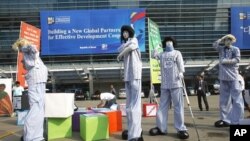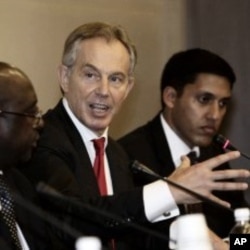More than 2,000 delegates are in Busan, South Korea, this week for the opening of the Fourth High Level Forum on Aid Effectiveness.
The delegates include representatives of NGOs, the private sector and philanthropic organizations. Also on hand are officials such as U.N. secretary-general Ban Ki-Moon, U.S. secretary of state Hillary Clinton, and Britain’s international development secretary, Andrew Mitchell.
Targets
|
Among those attending the conference is former British Prime Minister Tony Blair, who spoke with VOA's Victor Beattie about reforming the way help is given.
|
They’ll be evaluating the state of development aid and negotiating measures to improve the quality and management of that support by partner countries. Along with emerging donors, including Brazil, Russia, India, China and South Africa, the delegates will be trying to achieve a consensus on the delivery of aid.
Over the past ten years, three previous international meetings on development assistance have been convened by the OECD, Organization for Economic Cooperation and Development. The results of those meetings in Rome, Paris and Accra were a set of targets aimed at improving the results of aid. Delegates in Busan will talk about whether and how to stick to them.
Among the so-called Paris Declaration principles is a commitment by donors to harmonize their development plans in an effort to cut costs and avoid duplication.
Donor missions
Studies show the number of aid projects have grown over the years.
In 1960, there were usually only two countries giving aid, the U.S. and the Soviet Union. One study today shows that finance ministers in some recipient countries spend up to a third of their time receiving over 250 donor missions in one year, rather than focusing on long-term development plans. With the joint management by donors of field missions, developing countries could deal with a reduced number of larger projects, rather than several smaller ones.
The principles also include a commitment to encourage and support development plans drawn up by developing countries. That includes aligning aid with national priorities and including aid flows in national budgets.
Accountability
Recipient nations agree to improve their financial management and procurement systems. Both donors and their national partners also agree to adopt a system to measure results and to hold each other accountable.
Lawrence Macdonald, the vice president for communications and policy outreach at the Center for Global Development in Washington, D.C., explains the importance of host country ownership of projects.
He says in emergency situations, it’s normal for donor countries to depend on international NGOs to deliver assistance, but that in the long run, it harms efforts to create self-sustaining projects.
Relience on aid
Over time that kind of reliance on outsiders can draw talent out of government. People would rather work for the Red Cross, Oxfam, or the UN where they can earn a higher salary than for their own government. You get on kind of a vicious cycle, where the government lacks capacity and so the NGOS and international organizations are doing development and the government never builds up capacity. So the notion that the country should develop its own program and identify its own priorities and donors should support those priorities is designed to counteract the situation of donor dependence.
Supporters of the Paris Declaration also support the concept of removing conditions on aid imposed by donor countries.
Yearly cost
Of the approximately $129 billion of aid given yearly to the developing world, about a third is estimated to be tied to the purchase of goods and services in donor countries. A network of NGOs from 19 European countries, the European Network on Debt and Development, estimates that tied aid reduces the purchasing power of aid by up to 40%.
"If the US gives a certain amount of money it has to be used to purchase US products or to pay U.S. consultants. That tied aid is ineffective. It raises the cost," said MacDonald. "If I could get my bulldozers on the international market I might be able to get them cheaper than if I get them from [the U.S. company]' Caterpillar. It also reduces the ability of the recipient country to use aid to develop its own capacity to solve problems. So they agreed it would be good to untie aid."
Several OECD members continue to support tying aid to development, including the European Union, Japan and the United States. Supporters say ensuring the involvement of businesses from donor countries in development projects makes it easier to earn public support for foreign aid.
Transparency
MacDonald says another topic that’s likely to come up at the meeting is the principle of transparency. He says some donors and international agencies are still slow to publish figures on how their aid is spent. He says Nancy Birdsall, the head of his own group, the Center for Global Development, favors the release of donor aid disbursements on a quarterly basis.
"If the donors are publishing this data in a consistent manner in an electronic format that is easily combined with other disclosures, then relatively small civil society groups can take the data and put it together in an easily accessed and read form" he added. "Then, the recipient government will be able to know how much money is spent where and for what.
"Civil society groups and NGOs [and contractors and groups that provide development services] can monitor that, so can tax payers in the rich world and beneficiaries in the developing world. You get a “many eyes” kind of phenomenon," continued MacDonald. "There’s the saying in the software industry ‘with enough eyes, all bugs are shallow’ and the idea with the transparency in foreign assistance is that with enough eyes looking at this, it will be possible to identify in efficiencies, corruption and to improve the effectiveness of the assistance."
Tracking aid
Delegates to the Fourth High Level Forum on Aid Effectiveness will be considering the adoption of a system to improve the tracking of aid flows and monitor impact, called the International Aid Transparency Initiative. Some countries, including France and Japan, prefer the current system, which activists say is insufficient. Some say the failure to adopt the new system will be a blow to donor support for greater transparency.
Participants at the Busan talks will consider how far donors and recipients have come in adopting the Paris principles for improving aid flows.
Recent studies show donors have more work to do.
Commitments
Gregory Adams, the head of the Oxfam delegation to the talks, says donors have failed to meet the commitments they made at previous global aid forums on improving the quality of their aid. Research by the OECD and by the Center for Global Development show industrialized countries have succeeded in meeting only one of several criteria used to measure their performance.
"On the 13 indicators they were measured against, they’ve made progress on one, which is “harmonization” - talking to each other better. In contrast, partner countries have done what they said they were going to do," said Adams. "So there is a very real disconnect on the agreement made six years ago [in Paris]. The nature of the deal was the idea we know aid works better when donors trust poor countries to manage it themselves. But donors find it hard to do that.
So, there was a set of commitments made. Partner countries agreed they were going to tackle corruption and manage their finances better, and donor countries agreed to trust recipient countries more: they would provide aid more predictably, make sure more money flowed through a partner country’s own institutions and, the results are in and partner countries did what they said they would do, and the donors have not.
Partners
Adams says donor countries are now pushing to scrap the system that keeps track of their progress on aid effectiveness.
"The big debate now is should there even be a global monitoring scheme, a set of indicators that track how well donor countries are doing," he said. "That decision will not be actually be made [what indicators are] at Busan. We’ve managed to push back a bit on the effort to abolish the indicators or cut them down to meaninglessness. But we want to be sure we get the right set of indicators that measures what is meaningful in terms of donors commitment especially on five key principles of Paris Declaration."
Adams hopes the delegates to the Busan forum, including China and other members from the global south as well as philanthropic organizations, will join OECD members in committing themselves to the Paris Declaration’s principles of effective aid.
Contributions
Development experts estimate Beijing’s contribution to be at least $25 billion per year, while private groups contribute over $50 billion. The World Bank estimates that by 2014, the BRIC countries [Brazil, Russia, India, China and South Africa] will provide 60 percent of global economic growth
Support for shared principles on aid and for more effective partnerships could appear in the outcome document expected at the end of the meetings.
Adams also hopes it will also include continued support for a global monitoring framework that will allow poor countries to demand accountability from rich ones.
Lawrence MacDonald of the Center for Global Development says to be successful, the summit, and final document, must rise above rhetoric to emphasize time-bound commitments to action.





